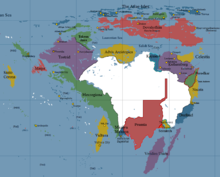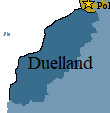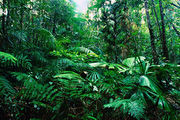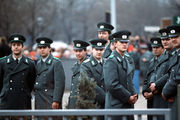Duelland
| This page is a work in progress by its author(s) and should not be considered final. |
| The Republic of Duelland The Republic of Duelland
|
|||
|---|---|---|---|
|
|||
| 'Motto: '"We are the Chosen People, United as One" | |||
| Anthem: "National Anthem of Duelland" | |||
Location of Duelland
|
|||
Local map of Duelland
|
|||
| Region | The East Pacific | ||
| Capital | Duelland City | ||
| Largest city | Duel City | ||
| Official languages | English/Codexian, Spanish | ||
| Recognised national languages | English/Codexian, Spanish | ||
| Demonym | Duellandian | ||
| Government | Federal Marxist-Leninist One Party Socialist State | ||
| - | President | Victor Stills | |
| - | Vice President | Edmond Silva | |
| - | Head of Government | Alex Gornden | |
| Legislature | People's National Assembly | ||
| History | |||
| - | Revolution in Morstaybishlian Chianski | 1949 | |
| - | Federation of the Democratic People's Republic of Chianski | 1951 | |
| - | Constitution of the Socialist Federal Republic of Chianski | 1954 | |
| Area | |||
| - | Total | 12,701 km2 4,904 sq mi |
|
| - | Water (%) | 96% | |
| Population | |||
| - | 2017 estimate | 26.7 million | |
| - | Density | 2102.23/km2 5,444.8/sq mi |
|
| GDP (PPP) | 2017 estimate | ||
| - | Total | $196.34 billion | |
| - | Per capita | $7,244 | |
| Gini (2017) | 3.30 low |
||
| HDI (2017) | 0.791 high |
||
| Currency | Chianskian Dollar ( CS$) (CSD) |
||
| Date format | dd ˘ mm ˘ yyyy | ||
| Drives on the | left | ||
| Calling code | 09 | ||
| ISO 3166 code | CHS | ||
| Internet TLD | .chs | ||
The Socialist Federal Republic of Chianski, also referred to as Chianski SFR, and most commonly referred to as Chianski, is a Federal Marxist-Leninist One Party Socialist State located on 10 tropical islands with 10 states spread across the volcanic-coral island chain island in the Central Concordian Ocean. The largest island, Telver, has almost all of its landmass covered by the capitol city of Telver, which is the largest city in Chianski and the main cultural and commercial center. Despite having no borders with other nations, Chianski's closest neighbors are South Hills to the east, Adumara and Astistan to the north, and Wikichang to the south. Chianski is currently a member of the FPA.
The ecosystems of Chianski are very uniform but ecologically diverse, with all of the islands being either tropical rain-forest or tropical grasslands. The islands host a wide array of coral reefs and shoals and each island is described as being a "microcosm" of numerous environments. The highest point in Chianski is Mount Tonava which reaches a height of 134 meters above sea level. Chianski has over 75 protected parks and preserves spread around the nation which protect numerous ecologically sensitive reefs and lands. Multiple species of animals are endemic to Chianski and the islands are host to numerous migratory birds throughout the year. The government has taken numerous measures to protect the environment and in recent years has begun to spend millions the preservation of the islands natural landscape.
First coming into its own as a proper nation state at around 1950, with the unification of the Islands, Chianski is now a world leader in public transport and public education. All healthcare, housing and education is free in Chianski. The income per-capita is around $7,244 Chianskian Dollars with little to no difference between the highest and lowest levels of society thanks to extremely punitive income taxes and strict government overwatch. Private enterprise is totally illegal, with all business being publically or government owned. Media in Chianski is controlled and censored by the government and the education system promotes the ideology of Marxist-Leninist Communism. Chianski is considered a post-modern state technologically wise.
History
Original Inhabitants
Vulpine & Humans settled the islands that would later be called Chianski around the year 1000 AD/CE, when nomadic seafarers ventured into the area. The original inhabitants built forts and other identifiable ruins on the islands, some of which are still partially intact.
Various land forces came upon the islands in the 17th and 18th centuries, but it was the Humans who were the first to permanently settle in the territory and with the arrival of Vulpine missionaries in 1830 the population was mostly converted to Vayan Catholicism. On 5 April 1832, the missionaries asked for protection after a rebellion of a part of the local population and as a result, multiple kingdoms were established across the islands.
Morstaybishlian Chianski
WIP
Revolution
WIP
Unification
WIP
Federation
WIP
Modern Day
WIP
Geography
The total combined land area of Chianski is 12,701km² of land including the natural, reclaimed and artificial land of Chianski. The climate on the islands are practically all the same with the islands having a hot and humid tropical environment. Extreme weather events are uncommon in Chianski however the biggest threats to the islands are from cyclones and tsunamis. All of Chianski is tropical, with large rainforests spread across the islands. The dormant Tonava Volcanic Bluff is centred in the middle of the Tonava Island and the highest point in Chianski is located on said island. The lowest point in. Chianski is the Palmer Sinkhole and it dips −1.1 m below the sea level.
Climate
Chianski has a tropical climate with distinct wet and dry seasons and the average maximum temperature being remarkably similar all year round. The dry season runs from about May to September, during which nearly every day is sunny, and afternoon humidity averages around 30%.
The driest period of the year, seeing only approximately 5 mm (0.20 in) of monthly rainfall on average, is between May and September. In the coolest months of June and July, the daily minimum temperature may dip as low as 14 °C (57 °F), but very rarely lower, and a temperature lower than 10 °C (50 °F) has never been recorded in Chianski. Mt Tonava which is away from the coast however can occasionally see temperatures as low as 12 °C (54 °F) in the dry season. Prolonged periods of no precipitation are common in the dry season in Chianski although a no-rainfall event of long extents are rare. The 3pm dewpoint average in the wet season is at around 24.0 °C (75.2 °F).
The highest temperature recorded in Chianski was 50.4 °C (122.7 °F) on 17 October 2009 at Telver International Airport, while the lowest was 10.4 °C (50.7 °F) on 29 July 1982 at the Mt Tonava Station, which is further from the coast and routinely records cooler temperatures than the other meteorological stations. The lowest maximum temperature on record was 18.4 °C (65.1 °F) on 3 June 1972 while the highest minimum was 30.7 °C (87.3 °F) on 18 January 1998.
The wet season is associated with tropical cyclones and monsoon rains. The majority of rainfall occurs between December and March when thunderstorms are common and afternoon relative humidity averages over 70 percent during the wettest months. It does not rain every day during the wet season, but most days have plentiful cloud cover; January averages under 6 hours of bright sunshine daily. The hottest month is November, just before the onset of the main rain season. The heat index sometimes rises above 45 °C (113 °F), while the actual temperature is usually below 35 °C (95 °F), because of humidity levels that most would find uncomfortable. Because of its long dry season, Chianski has one of the most daily average sunshine hours (8.2) of any East Pacific nation with the most sunshine from April to November. The sun passes directly overhead in mid October and mid February. The average temperature of the sea ranges from 27.8 °C (82.0 °F) in July to 32.5 °C (90.5 °F) in December.
| Climate data for Chianski 1966–2017 | |||||||||||||
|---|---|---|---|---|---|---|---|---|---|---|---|---|---|
| Month | Jan | Feb | Mar | Apr | May | Jun | Jul | Aug | Sep | Oct | Nov | Dec | Year |
| Record high °C (°F) | 37.7 (99.9) |
38.3 (100.9) |
37.8 (100.0) |
38.3 (100.9) |
37.4 (99.3) |
37.8 (100.0) |
39.7 (103.5) |
41.1 (106.0) |
45.3 (113.5) |
50.4 (122.7) |
41.8 (107.2) |
38.8 (101.8) |
40.4 (104.7) |
| Average high °C (°F) | 32.4 (90.3) |
32.2 (90.0) |
32.7 (90.9) |
33.5 (92.3) |
32.6 (90.7) |
31.2 (88.2) |
30.6 (87.1) |
31.7 (89.1) |
33.0 (91.4) |
36.1 (97.0) |
34.2 (93.6) |
33.6 (92.5) |
32.6 (90.7) |
| Average low °C (°F) | 25.2 (77.4) |
25.0 (77.0) |
24.9 (76.8) |
24.4 (75.9) |
22.6 (72.7) |
20.8 (69.4) |
19.7 (67.5) |
20.9 (69.6) |
23.3 (73.9) |
25.1 (77.2) |
25.5 (77.9) |
25.6 (78.1) |
23.6 (74.5) |
| Record low °C (°F) | 20.2 (68.4) |
20.5 (68.9) |
20.0 (68.0) |
18.9 (66.0) |
15.7 (60.3) |
13.4 (56.1) |
10.7 (51.3) |
14.7 (58.5) |
17.2 (63.0) |
20.4 (68.7) |
16.7 (62.1) |
20.8 (69.4) |
13.4 (56.1) |
| Rainfall mm (inches) | 393.2 (15.48) |
329.7 (12.98) |
257.0 (10.118) |
102.6 (4.039) |
14.3 (0.563) |
3.0 (0.118) |
1.3 (0.051) |
1.6 (0.063) |
12.8 (0.504) |
51.6 (2.031) |
124.0 (4.882) |
241.8 (9.52) |
1,532.9 (60.35) |
| Avg. rainy days | 18.4 | 17.8 | 16.0 | 7.3 | 1.4 | 0.6 | 0.2 | 0.3 | 1.7 | 5.0 | 10.0 | 14.3 | 93 |
Ecology
Government
The Chianski SFR is a One-Party Socialist State where members of the Communist & Socialist Party hold all important positions in the state. Political rights and freedoms are severely limited. The only legal political party in Chianski is the Socialist Unity Party of Chianski. The Communist Party of Chianski is legal, but cannot run in any 'elections'.
Foreign Relations
Chianski has established embassies in the following nations:
The following nations have embasses in The Chianski SFR
The following nations have agreed to a Cultural Exchange
The following nations have agreed to Trade Agreements
The following nations have agreed to a Non-Aggression pact
The following nations have agreed to Joint Military Exercises
Chianski is currently a member of the FPA (Fire Pact Alliance).
Military
Main Article: People's Liberation Forces of Chianski SFR
The People's Liberation Forces of Chianski SFR, or PLFC, occasionally referred to as PLC, are the unified de facto military forces of Chianski SFR. All troops in the PLFC are volunteer only and enlistees must be a Chianski SFR citizen or permanent resident, no discrimination is made on the basis of gender, disability or species. They must also be aged 19 or older and meet set physical, medical and psychological standards. All troops of the PLFC undergo 8 months of basic recruit training involving, drill & discipline, firearms training, teamwork and comradeship. Officers undergo a similar program however there is more emphasis on leadership, administration and ceremonial drill.
Economy
Chianski's economy is centrally planned and managed with all business being entirely publically or government owned. In Chianski the prices of basic goods and services are set by central government planners, rather than rising and falling through supply and demand. The nominal GDP is 196.34 billion. Unemployment is at 3.24%, largely due to the fact that the right to work is enshrined in the Communist Party's Ideals. According to recent audits, Information Technology is currently Chianski's largest industry, followed by Tourism and Book Publishing.
Global Trade
The Chianski SFR has currently agreed to trade agreements with the following countires:
Imports & Exports
Chianski is currently importing agricultural products and produce from Furnifold whilst Furnifold has agreed to contract a state IT Company to install DSL & internet lines and infastructure in Furnifold
People & Culture
(Creating a unique culture is somewhat difficult, and after you've been in TEP for a time, you'll organically come up with a culture)
Ethnicity & Population
(Add Population density, whether the population is growing, any interesting things about the population that happened in the past.)
Religion
(You could either have your own unique religion, and/or use religions found in real life, and/or use religions other users have created)
Languages
(For this section, you really just need to list what languages are most common. We have a few counterparts for languages: French is Wachovian, Codexian is English, Kostuvian is Arabic, etc. If you need to check what RL languages have IC counterparts, ask the Evolved chat. If no response, just PM me.)
Sports
(Optional section, but stuff about what sports you play, what your nation's best at, etc.)
Art & Music
(Optional)
Infastructure
(This entire section is optional, you don't really have to elaborate on it unless you want to)





